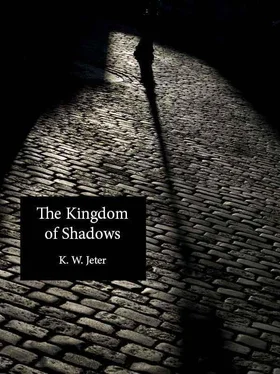K Jeter - The Kingdom of Shadows
Здесь есть возможность читать онлайн «K Jeter - The Kingdom of Shadows» весь текст электронной книги совершенно бесплатно (целиком полную версию без сокращений). В некоторых случаях можно слушать аудио, скачать через торрент в формате fb2 и присутствует краткое содержание. Жанр: Триллер, на английском языке. Описание произведения, (предисловие) а так же отзывы посетителей доступны на портале библиотеки ЛибКат.
- Название:The Kingdom of Shadows
- Автор:
- Жанр:
- Год:неизвестен
- ISBN:нет данных
- Рейтинг книги:5 / 5. Голосов: 1
-
Избранное:Добавить в избранное
- Отзывы:
-
Ваша оценка:
- 100
- 1
- 2
- 3
- 4
- 5
The Kingdom of Shadows: краткое содержание, описание и аннотация
Предлагаем к чтению аннотацию, описание, краткое содержание или предисловие (зависит от того, что написал сам автор книги «The Kingdom of Shadows»). Если вы не нашли необходимую информацию о книге — напишите в комментариях, мы постараемся отыскать её.
The Kingdom of Shadows — читать онлайн бесплатно полную книгу (весь текст) целиком
Ниже представлен текст книги, разбитый по страницам. Система сохранения места последней прочитанной страницы, позволяет с удобством читать онлайн бесплатно книгу «The Kingdom of Shadows», без необходимости каждый раз заново искать на чём Вы остановились. Поставьте закладку, и сможете в любой момент перейти на страницу, на которой закончили чтение.
Интервал:
Закладка:
Marte turned her head away from the sofa cushion and kissed him, feeling how avidly he set himself to consume her. His jacket and the shirt beneath dropped onto the rumpled fall of her dress upon the floor.
Later – she didn’t know when; she had retreated into that small, hidden part of herself – she opened her eyes when she heard a distant keening sound, a high-pitched shiver in the air. It took her a moment to realize that it was an air-raid siren, that urgent cry that had become so familiar in the last few months, bringing Berlin from its sleeping dreams to a waking one.
Past the screen on which she had seen her child, and past the drawn curtains of the tall windows of the Joseph’s Ministry office, she saw the beams of the searchlights sweep across the sky. The bass drone of the bombers mounted beneath the wail of the sirens. With the first impacts, that rattled the glass in its frames and sifted a fine plaster dust from the ceiling, Joseph raised his head. His hands still gripped her bare arms as he gazed out toward the city’s luminous night. Above the clouds, the distant, ghostly forms of the bombers passed in and out of darkness.
She watched, looking up at Joseph’s face, as his feverish gaze followed another perfect drama.
He lay on the narrow bunk, his eyes closed, dreaming. Though not yet asleep; awake enough to know that his dream was part memory. Of a time when he had sat in a darkened theater, surrounded by others, all of them gazing up at the screen before them, at the faces that were so much more real than they themselves were.
One of those faces, the most beautiful one of all, was tucked inside the curl of his arm, his hand clutching tight the wrinkled photograph. Pavli held on to the little piece of brightness, the image of her face, the angel of the shop window. He would have to hide it again before the dawn, before anybody in the dormitory of the Lazarene men could see him with it, even his own brother. None of them would understand. They had shut him out, made him an outcast from their faith… it didn’t matter why they had done that, to protect him or not. It didn’t matter because he had a faith of his own to comfort him.
He would hide the photograph of Marte Helle, perhaps back in the lining of his boot, or some other place he would find, that would be as safe. But for now, he wanted it here, close to him, so he could see her face in the faint moonlight that came through the barred window high above his head.
All over the world, in this world and the next, people dreamt and remembered. Even here, among these who were still his brethren somehow, still his blood. In the night’s darkness, in their dreaming, they were all denizens of that other land, moving among the shadows and ghosts that called their names, that bent forward from the bright heavens and bestowed a kiss upon their upraised lips.
And farther… beyond the breathing and murmurs of the Lazarenes… in Berlin and across the fields of night and of the coming day. There were others – he could sense their dreaming as well.
Some dreamt of her. The angel. Awake or in sleep… in the small theaters bound by their skulls, or on the great luminous screens rising before them… they dreamt of her.
As he did.
Pavli squeezed his eyes shut tighter and whispered her name. So softly, that no one would hear.
No one but the angel…
SEVENTEEN
A bird – tiny, brown, indistinguishable from the others – pecked at the bread crumbs that Pavli had scattered through the bars onto the stone ledge outside. He stood far enough back so that it wouldn’t be frightened away, and watched and listened. The bird hopped from one crumb to the next, but made no other sound.
Matthi had told him that birds could speak – really speak, not just a parrot’s idiot squawk – if they wanted to. He hadn’t been able to tell if his older brother had been joking or not. A little story, something else the Lazarenes knew: that when the Savior had hung upon the cross, blood trickling from his wrists and brow and side, the anguished cry to His Father hadn’t been His last words. The crows and ravens of Golgotha, that stripped the dead flesh from the bones and perched upon the skulls that gave the hill its name, had perched upon His outstretched arms – the thieves on either side of Him were already dead and couldn’t hear – and leaned close to His whispering mouth, so they might be told the last of His secrets.
“And from the ravens,” Matthi had said, “all the other birds learned to speak. So when St. Francis had a flock of birds before him, he hadn’t been preaching to them, but listening. And learning…”
A silly story. Perhaps it was true. The brown wren-like bird clicked its beak on the last crumb, glanced back at Pavli with one bright-bead eye, then flew away to the grey-barked trees in the distance.
It was time for Pavli to go as well. He turned and opened the door behind him, just far enough to slip through. He closed it carefully and silently behind himself, then turned and ran down the asylum’s corridors.
He had the freedom of the building. Within its walls at least, he could move about as he wished. The privilege that came with what he had attained, the niche he had clawed out for himself. The false gypsy’s advice had been right – to survive, you had to make yourself useful. To them, the guards and the other SS men, from the officers down to the lowliest rifle-toter. The least of them was more powerful now than even the most exalted Lazarene elder; they could do anything for you, from looking the other way when you walked into some restricted area of the building and its grounds, to increasing your rations. If they wanted to; if you were useful to them.
But most important of all, you had to be useful to him… to Herr Doktor Ritter. No one outranked him here; no one was more powerful, more capable of deciding your fate. Into this sealed little world, he brought the atmosphere of a darker and colder sphere beyond the fences topped with barbed wire, like a wind drifting through mountain crevasses where the sun never penetrated. Especially when Ritter came back from his weekly trips into Berlin, where he met with his colleagues in the Ahnenerbe. Working in the darkroom – or pretending to, when there was no real work to do – Pavli saw through the open doorway whenever Ritter returned, his boots shiny as black mirrors as he strode past to his office and laboratory at the end of the corridor. The next morning, the doctor’s studies would resume, and Pavli would receive his instructions about what photographs to take, what film would be used, every little detail.
Perhaps the angel of the shop window was looking out for him, guarding Pavli from whatever misstep would reveal him to be a fraud, an ignorant youth who was desperately using his few scraps of knowledge to pass himself off as someone useful. He knew it was foolish to think of her that way – he knew it was nothing more than the picture of a film actress, one who was distantly related to him by blood – but it comforted him to do so. It also explained his run of luck, that everything to which he’d turned his hand, everything that Ritter had told him to do, had meet with enough success to make the doctor nod in satisfaction. When something had finally gone wrong, a whole day’s worth of test shots turning out over-exposed and black in the darkroom trays, Ritter had scowled at the wet prints but had said nothing. Pavli’s gut had crawled with apprehension, as he’d expected any moment to be sent back to the dormitory with the others, while Ritter sent for a real photographer to be sent to the asylum. But nothing like that happened; they all had carried on as before, with nothing but a sharp comment from Ritter the next day, for him to avoid wasting the Reich’s precious technical resources.
Читать дальшеИнтервал:
Закладка:
Похожие книги на «The Kingdom of Shadows»
Представляем Вашему вниманию похожие книги на «The Kingdom of Shadows» списком для выбора. Мы отобрали схожую по названию и смыслу литературу в надежде предоставить читателям больше вариантов отыскать новые, интересные, ещё непрочитанные произведения.
Обсуждение, отзывы о книге «The Kingdom of Shadows» и просто собственные мнения читателей. Оставьте ваши комментарии, напишите, что Вы думаете о произведении, его смысле или главных героях. Укажите что конкретно понравилось, а что нет, и почему Вы так считаете.












